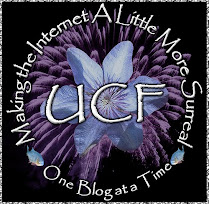I try not to be a creature of extremes.
Mostly because it leads to a less than peaceful life, but also because, given enough time, such extremism turns me into a screeching harpy with no sense of proportion.
And no one wants to be a screeching harpy. It's just
unattractive.So this year, I'm trying to make an effort to explore areas in which I have extremist tendencies and learn more about the other side of the argument. I'm doing this in an attempt to reach a happy median in my viewpoint.
First up on the agenda is the subject of religion, specifically religion in public life.
When this subject comes up, even in the most non-confrontational ways, I tend to get defensive and wrapped around the axle. If the subject becomes teaching religion in public schools or someone insisting the United States is a "Christian Nation," I get downright
stabby.So I'm trying to get a handle on my feelings about this, and try to determine what aspects of this topic deserve a passionate response, and which I should learn to let go.

In that vein, I just finished listening to
American Gospel by
Newsweek editor-in-chief
Jon Meacham.
This book takes an historical look at religion in American public life, examining the historical context of the founding fathers' beliefs, and the inclusion of a "God of Providence" in their endeavors to create our nation. He's an equal opportunity slammer, and spanks the evangelical Christians and the rabid atheists equally. The evangelicals for trying to co-opt our nation's founding into their tired "America is a Christian Nation!" nonsense, and the atheists for interpreting the separation of
church and state to mean the separation of
religion and/or faith and state. In Meacham's view, there's a place for
religion and faith in public life and in government. The vast majority of our population believes in some sort of god, and he contends that including the perspective of faith in the public discussion is appropriate, providing its inclusion does not constitute hypocrisy or exclusionary practices.
I found this book to be even-handed and thoughtful, drawing on historical references and current events to make the point that people really ought to be better informed before they get on their high horse and complain that there's too much (or too little) religion in public life.
Ahem.
So I'm reevaluating my position.
Intellectually, I think the yardstick should be threefold: If a policy is made on the basis of religious belief and that religious belief is clearly demonstrated to contradict scientific consensus (cough, intelligent design, young earth creationism, cough), then getting stabby is the appropriate response. If a group attempts to teach their faith in public schools, then someone's losing an eye. And if the inclusion of religious belief is exclusionary (cough, Rick Warren, cough), then I'm breaking out the cutlery.
I'm going to try and let go of well thought out, inclusive, ecumenical demonstrations.
An example of this is Bishop Gene Robinson, whose
prayer yesterday at the Lincoln Memorial was inclusive, thoughtful, sincere, and written in such a way that even an agnostic like me can support the sentiments.
If you need me, I'll be traveling the road to the happy median...


























